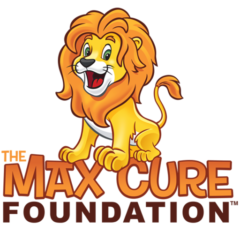Dear Friends and Colleagues II
July 2, 2017Child Life Services Grant
January 22, 2018The Max Cure Foundation’s Aggressive Research Mission and Continued Legacy of Support for Memorial Sloan Kettering Cancer Center
Almost ten years ago, Max Plotkin sat anxiously in a small exam room at Memorial Sloan Kettering Cancer Center while his parents, Chairman and co-founder David Plotkin and mother Annemarie Plotkin waited to find out why Max’s arm looked the way it did on the x-ray securely attached to the light board. When the dust settled, Max was treated at MSKCC for the rare diagnosis of B Cell Lymphoma of the bone. Max’s cancer was the first pediatric case of its kind at MSKCC, and thankfully to the amazing treatment team, Max is now a ten-year survivor.
The Max Cure Foundation began humbly as the Max Cure Fund at MSKCC and immediately created a huge impact and lasting legacy by helping to fund the launch of world-renowned pediatric oncologist and researcher Richard O’Reilly, MD’s Immune Cell Therapy Laboratory at MSKCC. Over the course of the last ten years, the Max Cure Foundation, through the Max Cure Fund at MSKCC has provided over $1 million dollars in direct research support to Dr. O’Reilly’s laboratory.
In 2017, under the direction of Executive Director Jonathan Agin, who lost his oldest daughter Alexis to pediatric brain cancer in January 2011, a bold new course was established for Max Cure’s research mission. Through Jonathan’s deep contacts in the pediatric cancer community and with the assistance of the members of Max Cure’s Medical Advisory Council, Max Cure sought to fund aggressive, transformative and translational projects.
 As 2017 came to an end, the Max Cure Foundation moved further along the path to this goal by providing a research grant to Kevin Curran, MD a clinician and researcher at MSKCC who specializes in blood and bone marrow transplantation. Dr. Curran has been heavily involved in pioneering the use of CAR-T cell therapy at MSKCC. This grant was made possible through the creation of the Connor Fund, established in 2017 in partnership and collaboration with Beth and Henry White who lost their six month old son Connor to brain cancer.
As 2017 came to an end, the Max Cure Foundation moved further along the path to this goal by providing a research grant to Kevin Curran, MD a clinician and researcher at MSKCC who specializes in blood and bone marrow transplantation. Dr. Curran has been heavily involved in pioneering the use of CAR-T cell therapy at MSKCC. This grant was made possible through the creation of the Connor Fund, established in 2017 in partnership and collaboration with Beth and Henry White who lost their six month old son Connor to brain cancer.
In 2017, CAR-T cell therapy gained FDA approval for treatment in patients up to the age of 25 with certain forms of leukemia. Dr. Curran has been involved in the research of CAR-T cell therapy at MSKCC and is embarking upon a bold effort to launch a clinical trial utilizing this treatment for patients with AML (acute myeloid leukemia). AML results in the largest number of deaths due to leukemia in the United States in part due to the lack of effective therapies upon recurrence. Dr. Curran’s goals for the initiation of a clinical trial at MSKCC fit squarely within Max Cure’s research direction and the collaboration forged through the Connor Fund and thus, we are proud to provide Dr. Curran’s laboratory with a $50,000 grant to support his efforts in launching this clinical trial.
Max Cure and the Connor Fund’s research grant to Dr. Curran is an example of utilizing research funding aggressively to fill specific strategic needs. Once again, we will be providing seed funding for the foundational support that will allow Dr. Curran to initiate a clinical trial. Specifically, Dr. Curran noted that this grant would allow his lab to move forward on a critical step towards opening the trial, which is the quality assurance/control testing of the method for gathering the specific CAR-T cells as well as then creating the cell bank to utilize for the trial. Dr. Curran remarked to Executive Director that it is very difficult to obtain funding for this critical component of his research. Thus, through this grant, we are seeding the project and accelerating it in the hopes of moving the specific CAR-T cell therapy into the clinic.

Ultimately, it is the hope of Dr. Curran and those involved in this research that the initiation of a clinical trial utilizing CAR-T cell therapy for patients with AML will reduce the number of deaths associated with the diagnosis. This would be a truly incredible result of course. Beyond this lofty goal, Dr. Curran hopes that his research is a gateway to the use of specific CAR-T cells for the treatment of many other forms of cancers that to date have very poor prognoses.
We are proud to support Dr. Curran’s research and resolved to create significant impact on the clinical level. We are not simply writing checks to write checks; rather we are writing checks to save lives.
